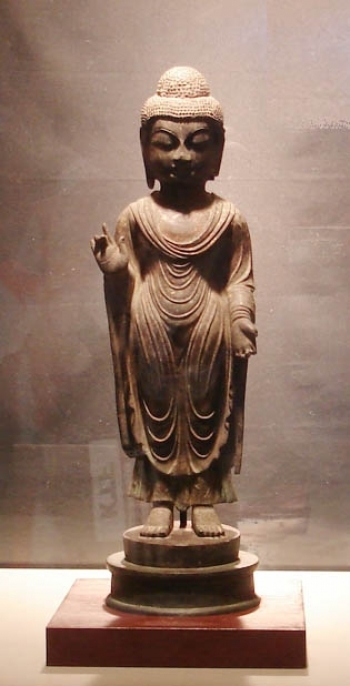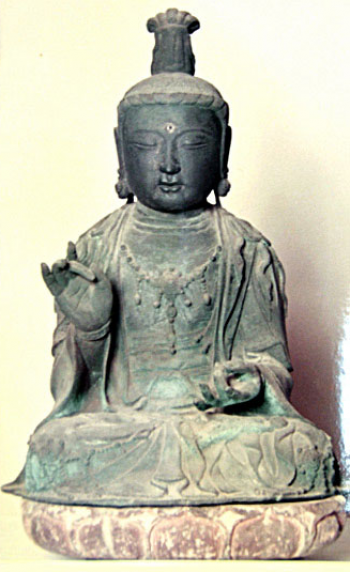A standing bronze statue of the Tathagata Buddha, one of two ancient Buddhist statues stolen from Japan three years ago by South Korean thieves and designated an important cultural property by the Japanese government, has been returned to the island city of Tsushima in Japan’s Nagasaki Prefecture, the city office said.
A ring of Korean thieves stole the two sculptures—the bronze standing Buddha made in the 8th century during Korea’s Silla dynasty (57 BCE–935 CE) and a seated statue of the bodhisattva Avalokiteshvara made in the 14th century during the Goryeo dynasty (918–1392)—from separate shrines in Tsushima in October 2012. Four people were arrested in South Korea over the theft after they tried to sell the artifacts, which were then confiscated by the authorities. The thieves were sentenced to prison terms of one to four years in 2013.
Despite repeated calls from Japan to return the sculptures, they remained in government custody at South Korea’s National Research Institute of Cultural Heritage on the grounds that the Japanese may have originally stolen them from Korea centuries ago during one of their numerous attempts to invade or in the 1910–45 colonial era.
South Korea’s Supreme Prosecutor’s Office subsequently ruled that no evidence had been found to indicate that the standing Tathagata Buddha statue had ever been illegally transferred to Japan, and no claims for its ownership had been made in South Korea.
“In accordance with the Criminal Procedure Law, the statue will be returned to the original owner in Japan,” the office said in a press statement earlier in July. (The Economic Times)
Officials at Japan’s Cultural Affairs Agency noted that when the statue was returned to the Kaijin-Jinja shrine on 18 July, it reported that the artifact was slightly chipped, although it was not known when the damage occurred.
Meanwhile, the Korean prosecutor’s office said that for the time being the second sculpture would remain in South Korea: “There is an ongoing legal dispute over its ownership and therefore no decision has been made as to whether to return it.” (The Economic Times)
Buseok Temple in the southwestern Korean city of Seosan, South Chungcheong Province, claims original ownership of the seated Avalokiteshvara, and a temporary injunction preventing its return to Japan has been issued.
There is evidence of original ownership by the temple in Seosan: a Japanese monk cleaning the statue in 1951 discovered a record hidden inside it stating that it had been made at the temple in the 1330s and was managed by the
















